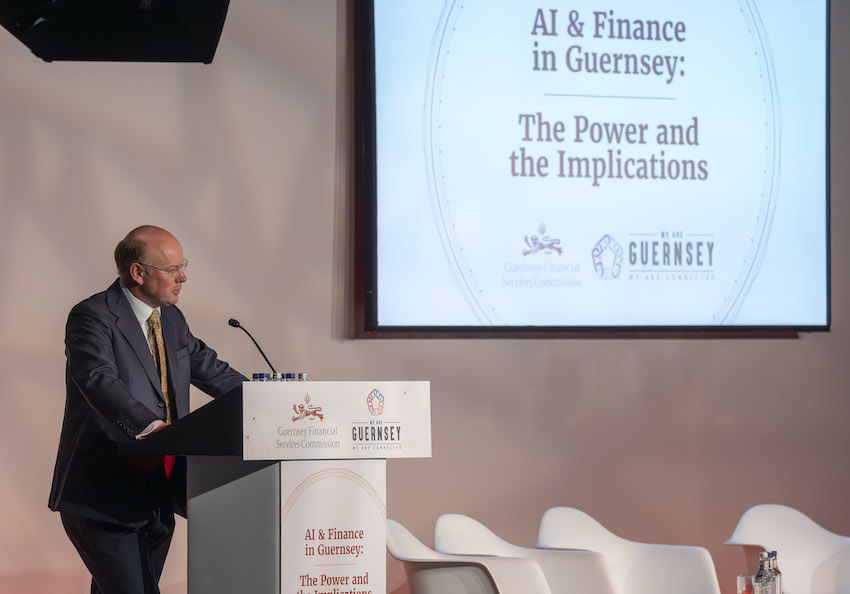


Changes are afoot to wide-ranging data protection laws in the UK to allow greater experimentation with artificial intelligence, according to a British Minister, with Guernsey encouraged to follow suit.
Lord Johnson of Lainston CBE, Minister of State in the Department for Business and Trade, spoke at a local AI conference this week which was hosted jointly by the Guernsey Financial Services Commission and Guernsey Finance.
“If we're going to survive as an economy, if Guernsey is going to flourish, if the UK is going to flourish, then we have to make sure that innovation and regulation fit very closely together.
He said he was "extremely positive about what AI can bring to us because I think there is a great deal in finance that can be automated," such as digital solutions for clients and running “more effective compliance processes".
“We don't want to constrain the opportunities that AI will give us in finance. But on the other hand, we have to be very aware of nascent technologies as they develop and to make sure that we have the right guardrails around them to ensure that we don't make significant mistakes as we have made in the past with other types of finance related activity,” such as automated trading trained on limited historical data.
Lord Johnson said the UK government is also “pouring money into the private sector or investing alongside investors like yourselves”.
He said the UK government is “deeply committed” to science and technology with billions being spent on semiconductors, quantum computing, creating new diploma and doctorate centers, and offering visas to allow skilled people to study or start businesses in the country.
The UK will also host the first global summit on AI within the next 12 months, he added, to inform a national AI strategy.
Now we head into an undoubtedly thought-provoking talk on the UK Government's approach to AI from Lord Johnson of Lainston CBE, UK Minister of State in the Department for Business and Trade. pic.twitter.com/ZGoQS9rOKU
— WE ARE GUERNSEY (@WEAREGUERNSEY) June 28, 2023
Lord Johnson said the UK is trying to find a new balance between enabling innovation and sufficient regulation by “trying to evolve” the European Union’s General Data Protection Regulation.
“There are certainly ways in which we can tweak the legislation and the classification of different types of data for AI and analytical purposes.”
He said this was pertinent “particularly when it comes to health data and the AI usage of health data, which is vital frankly for our long and sustainable lives,” which would allow health companies to improve access to and analysis of large datasets.
“I don't think we've got there yet, but we're working on it and that's very encouraging just to make sure that we don't lose the power of using anonymised data.”
Nevertheless, he said there is a clear need for safeguards “in terms of how these large data sets can be used”.
Lord Johnson also said individuals being able to earn cash from the processing of their own digital data is on the horizon: “Everything should really be about incentives, and it surprises me when I talk to people who resist free data flows, and at the same time will be amazed when as a result of which their doctor won't be able to contact them because they haven't given permission specifically to allow them to be tested for whatever disease.
“If everyone in this room was going to get paid every time they went onto Google, well, you wouldn't mind if your data was being used.”

Pictured: William Mason, Director General of the GFSC, told delegates responsible technology is always welcome.
The rollout of digital identities will also need to be accelerated for companies to reap the benefits of automated processes, he added, with the Economic Crime and Corporate Transparency bill, which is currently going through parliament, considering this, but more work is needed.
“A lot of that hinges upon the concept of personal identity and company registrations and account detail management, which is still at a sort of pre-AI, pre fully digital stage,” he said.
“So additional measures and approaches have to be brought to bear in terms of how you identify yourself. And so it won't be long before we can breathe a huge sigh of relief and not have to produce passports and gas bills in order to identify ourselves. But we'll have our digital identities and we will have systems that will just enable us to receive better services.
“And as far as companies go, it will enable you to run your businesses more safely and more effectively and frankly to a greater degree of scale."

Pictured: The wide-ranging conference on AI was held at Beau Sejour on Wednesday.
When asked if government also needs to seriously consider preventing the negative outcomes of AI, even stopping its proliferation, if necessary, Lord Johnson indicated that more should be done by individual governments to consider the issues.
Some jurisdictions like Singapore are constantly talking about AI in his experience while others, including the UK, do not have the same focus in the public sector.
“I would actually press from all quarters and ask everyone in the audience to press all governments around the world to look more closely at AI.
“I think if the public sector was doing more, it would help them define the guard rails and some of the issues that, that, that we want to discuss further."
Political leadership internally and externally would help that mission, he added.

Pictured: Lord Johnson said the children of today are likely to have five different careers and be continually impacted by AI.
Lord Johnson also spoke more generally about the “extraordinary” and “profound impact” AI will have on people’s lives. He compared the trajectory of his life, being born in 1974, to the likely difference to that of his daughter, who was born in 2008.
“I've done the same job for nearly 30 years. I bought a car when I left university… you buy a house, you get married, you have children. Eventually I'll retire, and then I'll die."
Considering his daughter, he said: “She was born for sure - that's about the only thing we’ll have we have in common. She's not going to finish education. She's going be educated continually throughout her life.
“They think that someone born now will have five different careers. That's not five different jobs - that’s not moving from HSBC to Lloyd's or from Freshfields to Clifford Chance - that's five totally different careers. So, her educational processes will be completely different to mine.
“She's not going to buy a house - maybe she can't afford to buy a house in the west. She's not going to buy a car in the same way. She'll marry, she may have children in a different way. She won't be able to retire, and she may not die.
“The person born today or the young teenager going forward is going to have a completely different life cycle and will have completely different needs.
“And the reason why we have to invest so much in AI and my job to support you all in investing in the UK and its future opportunities is because we're going to have to meet the challenge in terms of how we're going to service these people's lives.”
People constantly needing to retrain, restructuring asset bases and the tax system, as well as “societal and philosophical knock-on effects” will have to be considered too.
All photos courtesy of Chris George Photography.
Big turnout at wide-ranging AI summit
“Time has come” to shake up “not fit for purpose” education system
Businesses should train staff on safe use of AI
FOCUS: Guernsey Institute taking proactive approach to AI
Comments
Comments on this story express the views of the commentator only, not Bailiwick Publishing. We are unable to guarantee the accuracy of any of those comments.